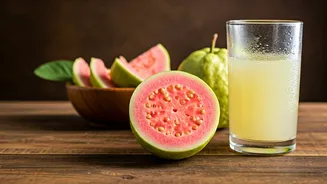Guava: A Superfood
Guava, often overlooked, is a nutritional powerhouse. It’s packed with vitamins, minerals, and antioxidants, making it a superfood. This tropical fruit
is more than just a tasty treat; it’s a natural source of vital nutrients that contribute to overall health. It contains high levels of vitamin C, which is essential for immune function, collagen production, and protecting cells from damage. Guava also boasts an impressive array of antioxidants, including lycopene, which fights free radicals and reduces the risk of chronic diseases. Additionally, it provides dietary fiber, aiding in digestion and promoting gut health. It also supplies potassium, which is important for maintaining healthy blood pressure, and magnesium, a mineral that supports numerous bodily functions. Incorporating guava into your daily diet is a simple yet effective way to boost your nutritional intake and support your health.
Boosting Immunity Power
One of the most significant benefits of eating guava is its ability to boost your immune system. Guava is exceptionally high in vitamin C, an essential nutrient that plays a crucial role in immune function. Vitamin C stimulates the production of white blood cells, which are the body's primary defense against infections and diseases. Consuming guava regularly can significantly enhance your body's ability to fight off colds, flu, and other illnesses. In addition to vitamin C, guava also contains other antioxidants that further protect the immune system. Antioxidants help neutralize harmful free radicals that can damage cells and weaken the immune response. By including guava in your diet, you provide your body with the resources it needs to defend itself against various threats. Regular consumption can lead to fewer sick days, enhanced energy levels, and an overall stronger immune system.
Improving Digestive Health
Guava is a fantastic source of dietary fiber, making it excellent for digestive health. Fiber adds bulk to your stool, promoting regular bowel movements and preventing constipation. This natural process helps in reducing the risk of conditions like hemorrhoids and diverticulitis. Beyond its fiber content, guava also contains tannins, compounds that can have an antimicrobial effect. These tannins may help to reduce inflammation and fight off harmful bacteria in the gut. Moreover, the antioxidants in guava can assist in reducing oxidative stress in the digestive tract. By eating guava, you are not only improving your regularity but also supporting the overall health of your digestive system, which is crucial for nutrient absorption and overall well-being. A healthy gut ensures better digestion, efficient absorption of nutrients, and a stronger immune system, contributing to better overall health.
Controlling Blood Sugar
Guava can play a role in regulating blood sugar levels. Several studies suggest that consuming guava can help improve blood sugar control, especially for individuals with diabetes or those at risk of developing the condition. The fiber content in guava slows down the absorption of sugar, preventing sudden spikes in blood glucose levels. Furthermore, certain compounds in guava may have anti-diabetic properties. These compounds may help improve insulin sensitivity, enabling the body to use insulin more effectively, which in turn helps keep blood sugar levels stable. Including guava in your diet could contribute to better blood sugar management, potentially reducing the need for medication and decreasing the risk of complications associated with diabetes. This makes guava a beneficial addition to the diet of people looking to maintain healthy blood sugar levels.
Promoting Heart Health
Guava is beneficial for heart health. It can help lower blood pressure and improve cholesterol levels, both of which are crucial for cardiovascular health. Guava contains potassium, which helps relax blood vessels, reducing blood pressure. Furthermore, the antioxidants in guava can help protect against oxidative damage to the heart and blood vessels. These antioxidants combat free radicals that can contribute to the development of heart disease. The fiber content in guava also contributes to heart health by helping to lower LDL (bad) cholesterol levels. By incorporating guava into your diet, you can support a healthy heart, lower your risk of heart disease, and improve overall cardiovascular function. Regular consumption of guava can be an effective part of a heart-healthy lifestyle.
Enhancing Skin Health
Guava's benefits extend to skin health. The antioxidants in guava, particularly vitamin C, help protect the skin from damage caused by free radicals and environmental stressors. These antioxidants can combat signs of aging, such as wrinkles and fine lines, by promoting collagen production, a protein that keeps the skin elastic and youthful. Additionally, guava contains vitamins and minerals that promote healthy skin. Consuming guava can contribute to brighter, more radiant skin. Moreover, guava leaves can be used topically to treat skin issues like acne and dark spots, due to their anti-inflammatory and antibacterial properties. Including guava in your diet, and potentially using guava-based products, can promote healthy, glowing skin from within.
Delicious Guava Consumption
Enjoying guava can be both simple and delicious. Firstly, you can eat it raw. Simply wash the guava, cut it into pieces, and enjoy it as a snack. The skin is edible and packed with nutrients, so there's no need to peel it. Secondly, blend it into smoothies. Combine guava with other fruits, yogurt, and a touch of honey for a nutritious and refreshing beverage. This way, you can easily incorporate guava into your breakfast routine. Lastly, make guava juice. Freshly squeezed guava juice is a great source of vitamins and minerals and is a delightful way to start the day. Whether you eat it as a snack, blend it into a smoothie, or make it into juice, guava is a versatile fruit. Experiment with these methods to find the ways you enjoy guava the most, making it a regular part of your healthy diet.














